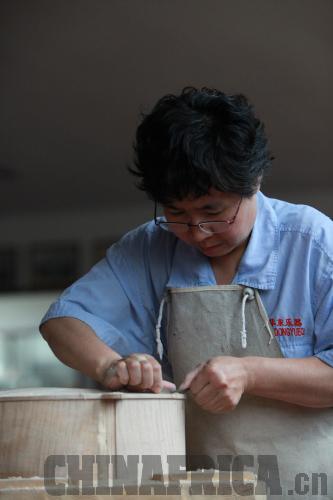|
 |
|
From Farm to Factory: Hands used to plant crops now help to make music (YANG JIA) |
Guo Lanzhen, a 47-year-old rural woman in Donggaocun Town of Pinggu District, northeast Beijing, is a salt of the earth farmer: rugged, resourceful and reliable. But this creative soul possesses a skill that is as far removed from farming as classical music is from rock and roll. Guo makes violins.
"I have been working on making the instruments for 14 years," Guo, now a worker at Huadong Musical Instrument Factory, told ChinAfrica. In Donggaocun, nicknamed the "home of violins," about 3,500 farmers like Guo, in a population of 33,000, are engaged in the violin-making.
It is said that one in three violins in the world is produced here. With such a large output, the town should be reaping the benefits of such a viable market. But the truth is that this third largest global violin-making base only gains a small slice of the profit margin in the industrial chain, as pricing is set by foreign agencies.
Despite this, violin-making does bring another job option to the community and helps improve the living standard of local farmers who previously were totally reliant on farming.
Violin haven
No one anticipated violin-making would grow to become a pillar industry of this rural town in the late 1980s, when some local farmers started the business. Today there are about 20 large violin manufacturers and 150 workshops in the town, forming a complete industrial chain from raw material supply and parts manufacturing to violin assembly.
It is estimated that about 300,000 musical instruments are produced every year, with the output value reaching 350 million yuan ($54.9 million), 30 percent of the town's GDP. Employing about 20 percent of the local farming community, the industry contributed about 20 million yuan ($3.14 million) to the annual revenue of the local government.
"Working here makes me feel like an urbanite, with regular working hours. Thanks to the job, I get an additional income, besides that from farming, of about 20,000 yuan ($3,140) annually," said Guo Lanzhen. In Guo's factory, the making of violins is divided into about 30 stages.
During the process of urbanization, more and more farmers became surplus laborers as agricultural technology improved and farmland diminished. Young, better-educated people in Donggaocun sought out their fortunes in Beijing where there were more opportunities and better-paid jobs.
However, for middle-aged farmers like Guo, who possessed no professional skills and only had farm work to rely on, jobs in the violin manufacturing factories were better options. "It doesn't require sophisticated skills. We villagers can do the work even though we are less-educated," said Guo.
"What's more, this job does not prevent us from doing farm work. During harvest or planting seasons, I can ask for a leave," she added.
|